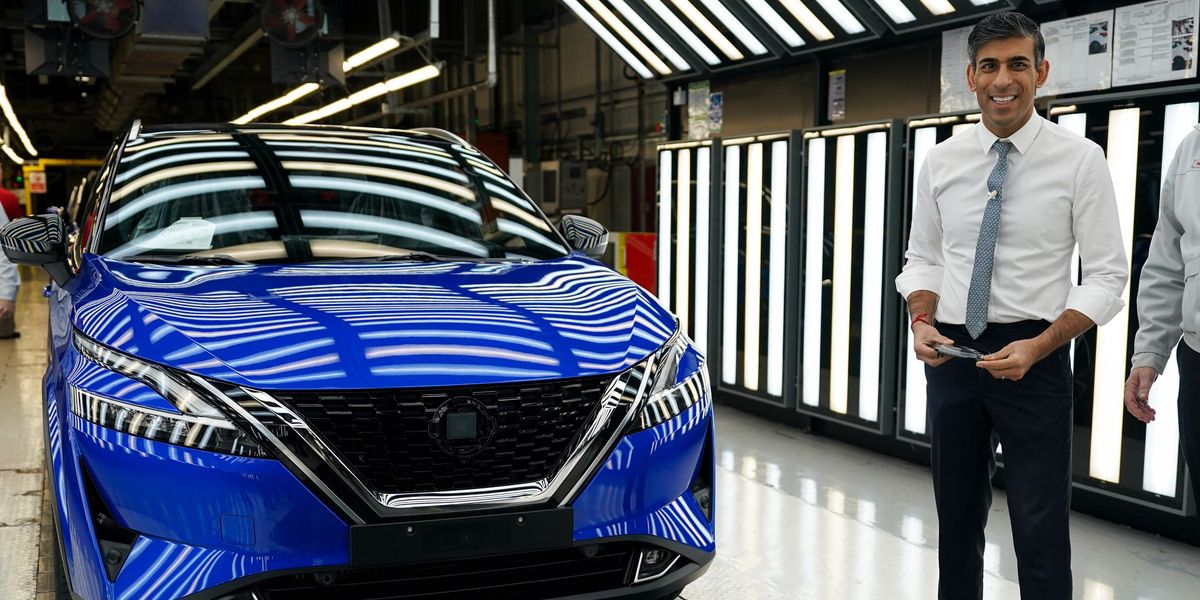Industry experts have criticised the Government for ignoring electric car drivers in the Autumn Statement with claims that Rishi Sunak had “sabotaged” the EV market.
Jeremy Hunt unveiled the Autumn Statement earlier this week, announcing tax and National Insurance cuts, although failed to mention many provisions that would help the nation’s hard-pressed drivers.
There have long been calls from organisations like FairCharge to slash the rate of VAT on public chargers to boost the use of electric vehicles.
Currently, drivers using on-street and other public chargers see an additional 20 per cent VAT rate on the cost of their charging.
WATCH NOW: Rishi Sunak reacts to Nissan’s £2billion EV investment
In comparison, VAT on domestic electricity is just five per cent, massively benefiting those who are able to charge their electric vehicles at home.
Last year, many people demanded former Chancellor Kwasi Kwarteng take a stand and support EV drivers by slashing the rate of VAT.
An open letter written to Kwarteng by EV campaign group FairCharge highlighted the impact of “high and volatile” electricity costs on drivers looking to switch.
It added: “One quick solution, that is totally within your control, is to heed the FairCharge campaign’s call for an immediate cut in VAT on the electricity delivered by our networks.
“Such a cut would immediately feed through to a reduction in prices. Further, it would show the strength of the Government’s continued commitment to transport decarbonisation.”
Commenting following the latest Autumn Statement, FairCharge slammed the Government for making the announcement an “EV free zone”.
It highlighted how a VAT cut on public charging would have “sent a clear signal” that the Government supports the uptake of electric vehicles across the UK.
The statement continued: “No wonder the OBR has downgraded their EV sales projections. Sunak’s 2035 U-turn has sabotaged the market – as we said it would.”
It comes at a time when there has been a 13p/kWh rise in the cost of peak-time slow charging at domestic chargers, like those seen at kerbsides and on lampposts.
Thom Groot, co-founder and CEO of The Electric Car Scheme, also reacted to the lack of VAT information in the “mini-Budget”, calling it a “missed opportunity”.
He said: “The Autumn Statement has been a missed opportunity for the Government to make driving an electric car far cheaper, something it could have done for very little cost.
“For example, ending the ‘pavement tax’ would cost an estimated £14million a year – a rounding error in a Government budget and less than one per cent of the money the Government spent keeping petrol taxes frozen earlier this year.
“Support schemes to help lower-income households purchase EVs directly would be more expensive but would greatly help the country kick its addiction to fossil fuels.”
Since the Autumn Statement, the Government has rolled out plans for the Public Charge Point Regulations 2023 which aim to make charging easier for electric car owners.
LATEST DEVELOPMENTS:
The price of slow charging has increased dramatically over the last month
PA
This includes having a 99 per cent reliability target, having contactless payment capabilities and clearly display how much it will cost to charge.

